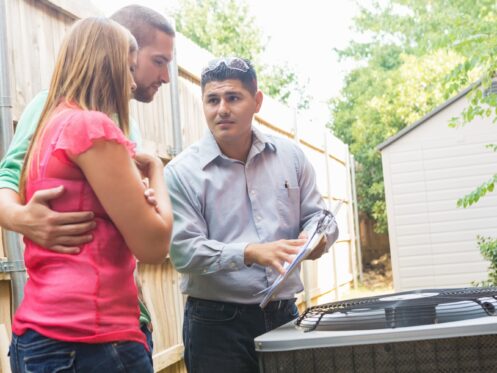Your heat pump is a significant investment, so keeping it running as long as possible makes sense. While these systems are built to handle years of use, skipping maintenance, overworking the unit, or ignoring small problems can lead to expensive repairs and early replacement.
Christian Brothers Air Conditioning Plumbing Electrical in Glendale, AZ helps homeowners get the most out of their heating and cooling systems with expert service and maintenance. Taking care of your heat pump will keep you comfortable and help you save money for many years.
Keep the Airflow Steady
Your heat pump needs proper airflow to work efficiently. If the air coming in or going out is blocked, the system has to work much harder than it should. A dirty air filter is one of the biggest things that can slow it down. When dust and debris clog the filter, airflow is restricted, making your heat pump struggle to move air through your home. Checking your filter once a month and replacing it every one to three months helps prevent this issue. If you have pets or allergies or live in an area with a lot of dust, you may need to change it more often.
Your outdoor unit also needs good airflow. If leaves, dirt, or tall grass are too close to it, they can block the fan and reduce efficiency. Keeping the area around your unit clear by trimming plants and removing debris helps ensure the system can breathe.
Keep the Coils Clean
Heat pumps use coils to move heat in and out of your home, but when those coils get dirty, they don’t work either. The outdoor coil pulls in heat during the winter and lets it go in the summer, while the indoor coil does the opposite. If dust and grime build up, your system has to work harder to heat or cool your home, which can wear it out faster. Keeping the coils clean helps your heat pump run smoothly and last longer.
Cleaning the coils should be done carefully. Spraying them with too much water or using harsh chemicals can cause damage. A technician can safely clean them during a maintenance visit to ensure they’re free of buildup. If you start noticing your heat pump running longer than usual to reach the right temperature, dirty coils could be the problem.
Give Your Heat Pump a Break
Your heat pump works all year to keep your home comfortable, but that doesn’t mean it should be running full blast all the time. Small adjustments can limit wear and tear and help your system last longer. One of the easiest ways to do this is by setting your thermostat wisely. Keeping the temperature moderate and avoiding extreme settings allow your heat pump to work efficiently without overloading it.
In the winter, lowering your thermostat slightly when you’re asleep or away can take some of the pressure off your system. The same idea applies in the summer—raising the temperature a few degrees when no one is home prevents unnecessary strain. If you have a programmable or smart thermostat, you can set schedules that automatically adjust the temperature, giving your heat pump a much-needed break.
Ceiling fans can also help your heat pump out by improving air circulation. In the summer, set them to spin counterclockwise to create a cool breeze. In the winter, switch them to clockwise at a low speed to push warm air down.
Watch for Warning Signs
Even though heat pumps are made to last, they can still break down. If you hear odd noises like buzzing, clicking, or grinding, it could mean that a part is loose or wearing out. A rattling sound might mean you have a loose panel, while a high-pitched squealing noise could mean the motor needs lubrication.
Another sign to watch for is uneven heating or cooling. If some rooms in your home feel much warmer or colder than others, there might be an issue with airflow, refrigerant levels, or even the thermostat.
Higher-than-normal energy bills can also point to trouble. If your bill suddenly spikes without any obvious reason, your heat pump might be working harder than it should. It could be something as simple as a clogged air filter, but it’s always a good idea to have a technician check things out before a small issue turns into a bigger problem.
Schedule Regular Maintenance
Just like a car needs tune-ups, you need routine heat pump services from a professional HVAC technician to keep it running smoothly. A technician can take a close look at important parts like the compressor, coils, and electrical connections to make sure everything is in good shape. They’ll also check the refrigerant levels since low refrigerant makes your system work harder than it should. If it’s too low, your heat pump will struggle to move heat efficiently, which can drive up energy use and cause bigger problems down the road.
During a tune-up, a technician will add lubrication to moving parts to keep them from wearing out. They’ll also clean the coils, check the thermostat, and make sure everything is working properly. If your heat pump hasn’t had a check-up in a while, scheduling a service visit can help it run better and last longer.
Keep an Eye on the Outdoor Unit
Since the outdoor unit is exposed to the elements, it’s important to check on it regularly. Rain, snow, and debris can cause issues if left unchecked. In colder months, ice buildup on the unit can block airflow and force the system to work harder. If you notice ice forming on the coils, it could mean there’s a problem with airflow or refrigerant levels.
Heavy storms or strong winds can also push leaves, twigs, or dirt against the unit, which can clog the system. After a big storm, check around your heat pump and remove any leaves, branches, or debris. Giving it plenty of space helps it run smoothly and prevents it from getting too hot.
Be Mindful of Power Surges
Heat pumps run on electricity, and sudden power surges can cause serious trouble. If your area gets a lot of lightning storms or power outages, your heat pump could be at risk. A big surge can fry circuits and even damage the compressor, which means expensive repairs.
A surge protector acts like a shield, keeping your system safe from sudden voltage spikes. Some homes already have whole-house surge protection, but if yours doesn’t, adding one can help protect not just your heat pump but also your fridge, washer, and other appliances. If your heat pump shuts off after a power outage, it’s worth getting it checked to make sure nothing got damaged.
Keep Vents Open
Blocked vents force your heat pump to work overtime. Check for furniture, curtains, or rugs blocking airflow—clearing them keeps temperatures even and your system running smoothly.
Some people close vents in unused rooms, thinking it will save energy, but this can actually make the heat pump less efficient. Your heat pump is meant to spread air evenly around your home. If vents are blocked, it can make the system work too hard. Keeping vents open and clear helps it run the way it should.
Learn More About Heat Pumps Today
Regular heating maintenance service, smart usage, and a little attention can go a long way in keeping your system running efficiently. We also provide HVAC system installations, duct cleaning, and indoor air quality (IAQ) solutions to keep your home comfortable year-round. If you’re ready to take better care of your heat pump, Christian Brothers Air Conditioning Plumbing Electrical is here to help—schedule your service today and protect your investment.










